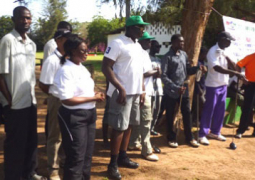The Ministry of Health and Social Welfare and the Gambia Bureau of Statistics (GBoS), in collaboration with other stakeholders, last Friday began a ten-day training workshop for Malaria Indicator Survey.
The training is held at the Gambia Telecommunication and Multimedia Institution (GTMI) hall in Kanifing.
Speaking at the opening ceremony, the deputy permanent secretary at the Ministry of Health and Social Welfare, Omar Sey, said the training is an important event that needs national support.
He added that it will provide information on core malaria interventions for evidence-based planning.
"Malaria remains a Public Health Challenge in The Gambia and the Government is highly committed to meeting the MDGs and the Roll Back Malaria targets for 2010 and 2015 respectively," he said.
According to him, an integrated approach to malaria control is being used to focus mainly on preventive and control strategies through widespread universal access to long lasting insecticide-treated nets (LLINs), prompt and effective case management, indoor residual spraying (IRS), intermittent preventive treatment in pregnancy (IPTp) and evidence-based information, education and behavioural change in communication.
DPS Sey said the exercise is in line with government's resolve to eliminate malaria in The Gambia as evidenced by the remarkable achievement realised in the programme.
He added: "The main objective of the survey is to generate information on core malaria prevention and control interventions such as household possession of long lasting insecticide nets (LLINs), the use of insecticide treated nets (ITNs) among the risk populations (children under-five and pregnant women), prompt provision of anti-malarial treatment for confirmed malaria cases in the past two weeks among children aged 6-59 months and 5-14 years, the use of fansidar ( SP) for intermittent presumptive treatment (IPT) by pregnant women and Indoor-Residual Spraying."
He said that in addition to the household interviews, the survey subjects will be finger-pricked and blood samples collected and tested for parasitaemia and anaemia. "Rapid diagnostic tests will also be used and on-site treatment for malaria will be provided for those found positive," he noted.
For his part, the Director of Gambia Bureau of Statistics (GBoS), Alieu Ndow, described the workshop as interactive and urged the participants to make good use of the training.



